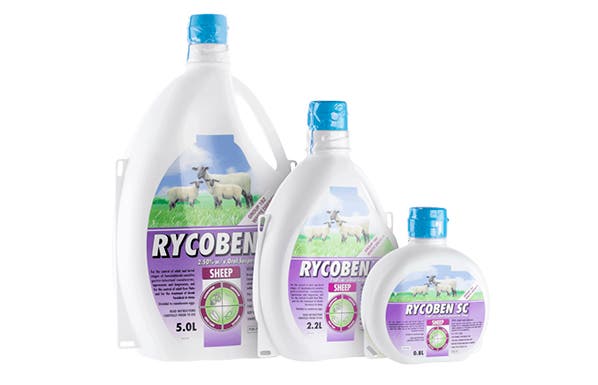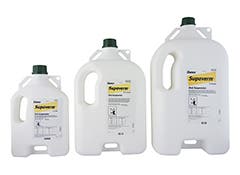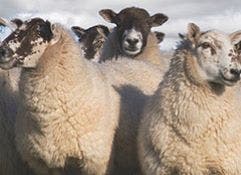Liver fluke in sheep - a growing threat
Liver fluke, or Fasciola hepatica, is a flatworm parasite that infects the livers of cattle and sheep as well as other grazing animals such as deer. Fasciolosis is the disease caused by liver fluke infestation and has a serious financial impact on livestock production: it is estimated that each case of liver fluke costs the farmer £25-£30 (€34-€42) per sheep1 and £6 per lamb1. Farmers can lose:
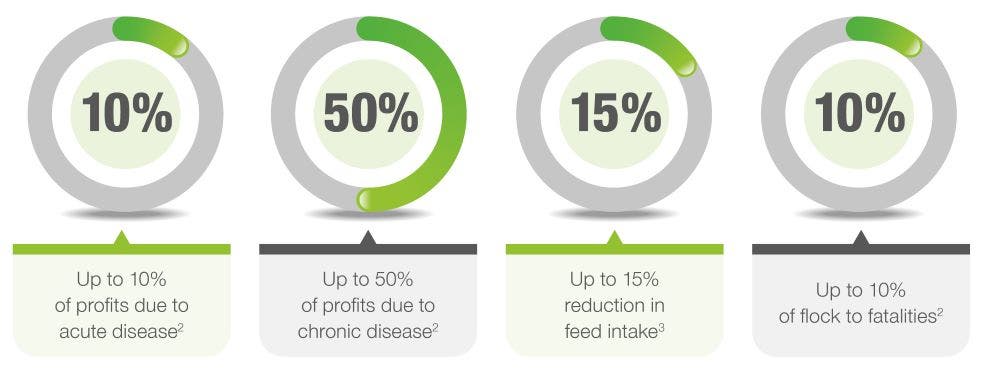
Liver fluke can increasingly be found throughout the UK, due to favourable weather conditions such as warmer temperatures and increased rainfall in autumn and winter, and due to both infected animals moving around the country and infected snails moving through flooded areas. The level of risk to animals is entirely dependent on the number of infectious cysts present on pasture when animals are grazing, which is dependent on how the weather impacts on mud snail habitats and life cycle.
Infecting the sheep: The infectious stage of the liver fluke life cycle is the tough cyst that forms on pasture (metacercariae). When the sheep ingests these cysts, they hatch out in the small intestine and migrate and travel to the liver. The early immature fluke chews its way through the liver substance, becoming the immature fluke when it reaches the small bile duct where it starts feeding on blood and continues to travel down to the main bile duct and gall bladder, where it becomes an adult after 10-12 weeks in the liver.
How the pasture is contaminated with liver fluke: The adult fluke produce thousands of eggs in the host sheep each day; these eggs are then passed out in dung, onto the pasture. When temperatures are above 10°C, the fluke eggs will develop and hatch into larvae, or miracidium; these then swim through water and wet mud to the mud snail, where they burrow in and infect the snail. Once inside the snail, the liver fluke larvae goes through more development stages, multiplying in number many hundreds of times, until they reach the cercariae stage when they leave the snail and swim through the water film onto pasture where they form the tough cysts (metacercariae). These are then eaten by the sheep - and the cycle starts again.
Liver fluke life cycle:
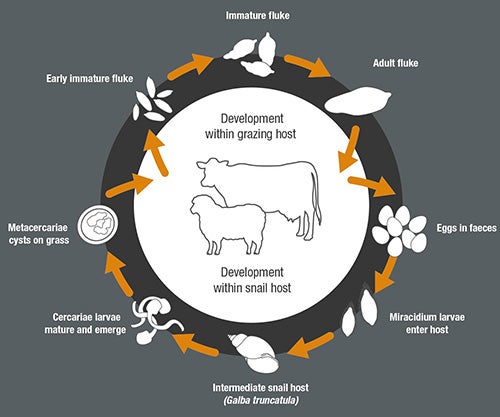
The level of liver fluke risk is dependent on the number of metacercariae cysts on the pasture: the greater the number of cysts, the higher the risk. Weather conditions and mud conditions determine the mud snail population which then has an impact on the number of cysts on the pasture:
Warm, wet and muddy conditions provide a beneficial habitat for the miracidium to swim from the egg to the mud snail, and for the mud snail population to increase. In ideal conditions it takes about 8 weeks for the fluke to develop from the miracidium to the cercariae in the snail. The snails will continue to produce these cercariae until environmental temperatures drop below 10°C. Therefore, the more snails that get infected, and the longer the weather stays above 10°C, the more metacercariae will accumulate on the pasture - meaning the higher the risk to grazing animals.
Cold and/or dry conditions slow down snail activity and development of the fluke so that instead of taking around 8 weeks for metacercariae to appear on the pasture, it could take 3-4 months. Once temperatures drop below 10°C, snail activity decreases and they burrow down into the mud to hibernate, with only a few surviving over winter. Although metacercariae will survive for months on pasture and can survive freezing, their numbers will gradually decline once snail activity has stopped.
While warm, wet weather conditions favour the liver fluke life cycle and increase the infection risk in the autumn and winter, hot dry weather can slow or stop snail and fluke life cycles, which makes the timing and level of challenge very difficult to predict. The challenge will therefore vary considerably from year to year and farm to farm.
The metacercariae will only be present on pasture where the snails are present, so doing a risk assessment of snail habitats is a good first step. Even if snails are present, these areas can be safe to graze before the metacercariae appear.
Testing the sheep will tell us when the fluke risk starts in any field. There are a number of diagnostic tests available to use when looking for liver fluke. Unfortunately, none of them on their own will give us all the information we need at all times of year, so we need to use a combination of different tests and information from other sources to fully understand where and when the fluke challenge is likely to happen on any farm.
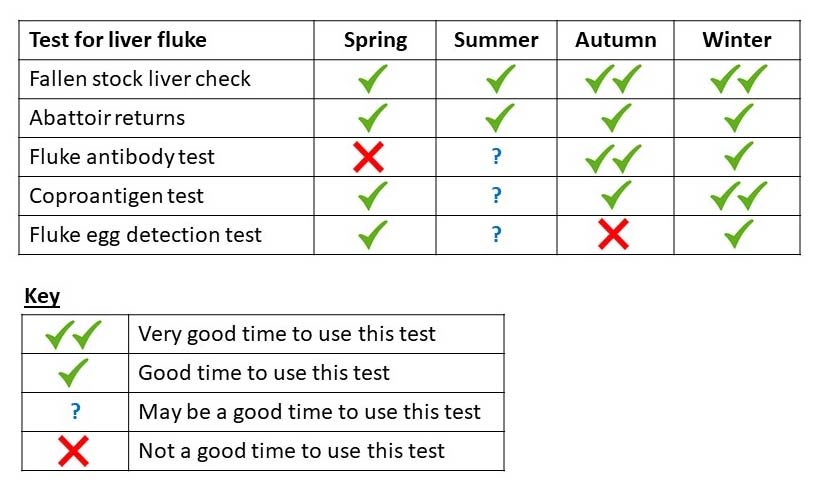
- Post mortem examination of fallen stock
- Why use this test? Never waste a dead sheep! Even if you are certain the animal died for another reason, it is worth checking the condition of the liver to see if there is any damage or liver fluke present. This is especially important in the early autumn.
- When to use this test? Every time.
- Abbatoir feedback
- Why use this test? If you are sending cattle or sheep direct to slaughter, any livers condemned - and the reason they were condemned - will be detailed on the kill sheet.
- When to use this test? Every time.
- Liver fluke antibody test (blood sample)
- Why use this test? Sheep develop antibodies to liver fluke within a few weeks of being infected for the first time. Although these antibodies give no protection to the animal, we can use them to show that an animal has been infected. This test will not tell us how many liver fluke are there, only that the animal has met a fluke.
- When to use this test? As the test detects liver fluke the soonest after infection (ie it can detect fluke at the early immature stage), it is best used at the beginning of the fluke season to detect when the infectious stages (metacercariae) are starting to appear, and therefore the risk of infection is starting. However, as the antibodies can last for months, including from the previous fluke season and after an animal has been treated, the test should be targeted at first grazing season animals (lambs are easiest), grazing known fluke risk areas. Once they test positive for fluke antibodies, there is a risk to all animals grazing those areas and there is no point in repeating this test in the same animals as they will remain positive for a long time.
- Coproantigen test (dung sample)
- Why use this test? This test is absolutely specific to Fasciola hepatica (liver fluke) as it looks for secretions from the liver fluke in the faeces of the host animal. This will give us an indication of how many animals in the group might be infected, as well as the level of infection in the individual animal. In field situations it can detect fluke infections from around 5-6 weeks after infection, with an increasing ‘score’ as the number and size of fluke present increase. NB as the test measures secretions from the fluke, a large number of smaller fluke will give a similar result to a smaller number of larger fluke. Coproantigen levels drop off quickly once the liver fluke are removed, so a positive result means there is active infection.
- When to use this test? Routine sampling, at any time during the season, preferably after a positive antibody test has shown the fluke challenge has started. Ideally 10 samples should be collected from the group and tested (pooling samples for coproantigen testing can give misleading results).
- Fluke egg detection (dung sample)
- Why use this test? This detects the presence of egg-laying adult fluke. These will already have been present in the liver for 10-12 weeks before they mature and start producing eggs. Although the fluke will produce thousands of eggs, they are released from the gall bladder into the gut intermittently, so not every faeces sample from the infected animal will have eggs in it. As the eggs are held in the gall bladder, they can continue to be found in dung samples for up to 3 weeks after the fluke has been removed.
- When to use this test? Best used as a pooled test, where multiple samples from a group are mixed together and analysed once, but not in the early part of the fluke season as it detects the presence of adult, egg-laying fluke. A negative result does not mean there are no fluke present, just that there are no adult fluke present. As a dung sample is used for the test, it is easy to use, but it does rely on a lab technician correctly identifying liver fluke eggs. Rumen fluke eggs are very similar to liver fluke eggs and both types of eggs can be easily confused with each other.
- Post mortem examination of fallen stock
The clinical signs of liver fluke in sheep can vary due to the level of infestation and damage to the host’s liver. The severity of disease caused by liver fluke is entirely dependent on the number of infectious metacercariae ingested by the animal.
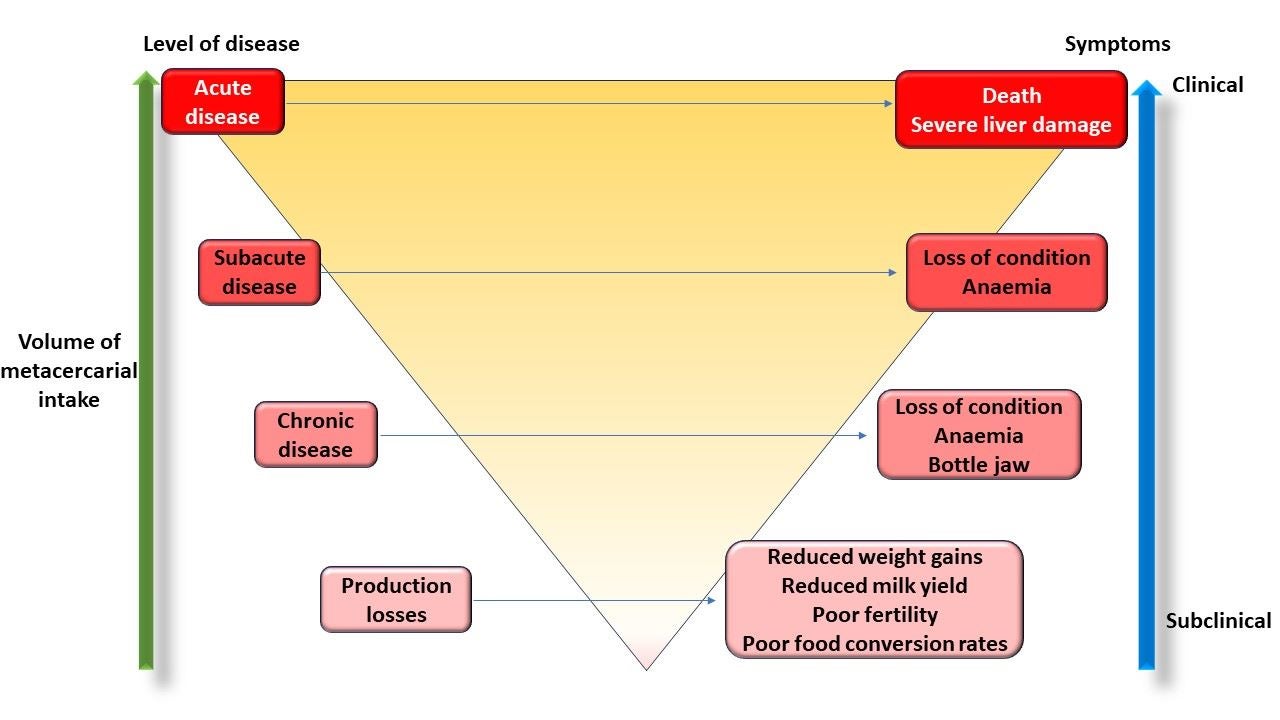
- Acute fluke disease occurs when a large number of cysts are ingested in a short period of time, resulting in the liver being so badly damaged that the animal dies. As the number of cysts on pasture are generally highest in the late autumn and early winter, we tend to see the most severe disease in early winter.
- Sub acute fluke disease results when slightly fewer cysts are eaten and the animal shows severe loss of condition and anaemia and may die.
- Chronic disease is caused by lower numbers of cysts being eaten. The animal survives long enough for the fluke to migrate through the liver to the bile duct and reach adulthood. As the adult fluke continue to feed on blood, the animal loses a lot of protein which results in low blood protein levels which allows fluid to leak from the circulation and cause signs such as ‘bottle jaw’.
- Production losses: very low numbers of fluke in the liver will cause no obvious clinical signs but will still have a significant impact on productivity (growth rate, milk yield etc).
Effective management of liver fluke in sheep is based on a ‘4 Point Plan’ that target the critical points in the fluke life cycle.
- Pasture protection: Using a targeted adulticide treatment in late spring/early summer to remove any remaining adult fluke and minimise the number of eggs reaching pasture.
- Pasture management: To minimise snail habitats and the snail population. For example, maintaining effective drainage, fixing leaky trough, minimising poached areas and ruts caused by vehicles.
- Grazing management: To avoid grazing areas of snail habitat once metacercariae start to appear on pasture. For example:
- electric fencing round wet or boggy areas;
- moving animals to lower risk grazing;
- housing to keep animals off high risk areas at high risk times of year;
- permanently excluding animals from the highest risk areas (environmental schemes)
- Effective treatment of animals at risk: Using the right active at the right time, according to the stages of fluke likely to be present in the animal.
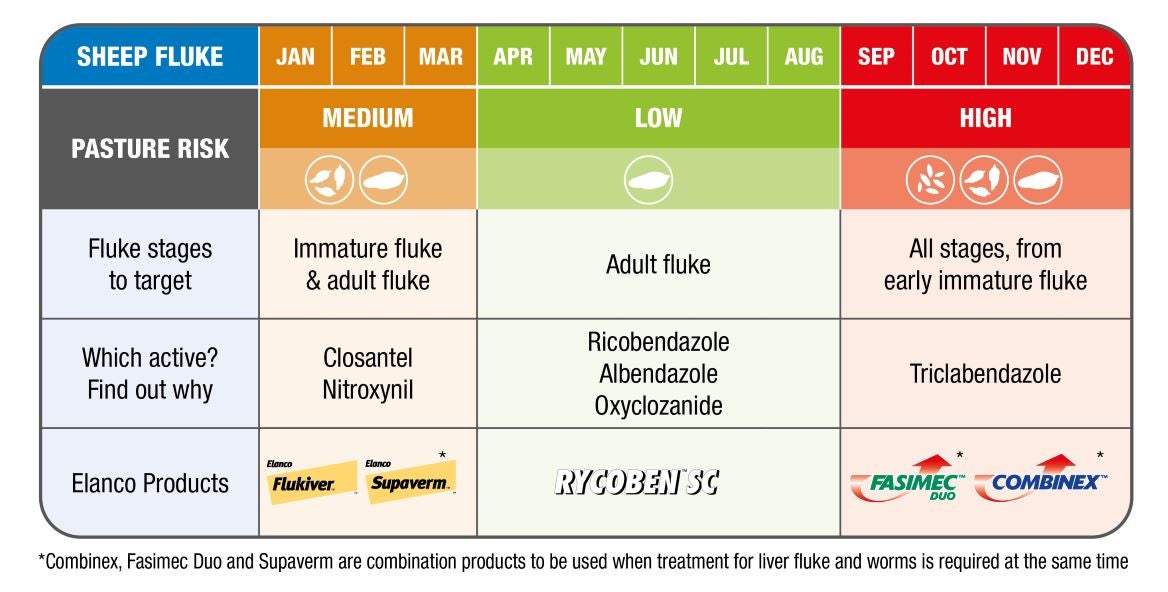
The fluke risk varies significantly from year to year and farm to farm, so monitoring the situation on your farm (see above) will allow the right product to be used at the right time.The rise of resistance: Resistance to triclabendazole has been identified on a number of farms. With this in mind, it is recommended to check that treatments have been effective.
We cannot rely solely on animal treatments to achieve effective liver fluke control. It is therefore essential to tackle all aspects of the 4 Point Plan.
- Pasture protection: Using a targeted adulticide treatment in late spring/early summer to remove any remaining adult fluke and minimise the number of eggs reaching pasture.
Rumen fluke (paramphistome) is a different parasite to liver fluke. Generally, mature rumen fluke do not cause clinical disease but there have been reports of disease caused by large numbers of immature rumen fluke in the small intestine, typically in youngstock. In some cases, this has resulted in ill thrift and profuse scour, while in severe cases it has been fatal in both sheep and cattle.
The clinical importance of rumen fluke is under debate. Diagnosis of rumen fluke is through faecal egg counts in dung samples or through post mortems. It is important to differentiate between liver fluke and rumen fluke eggs as only a small number of flukicides kill rumen fluke.
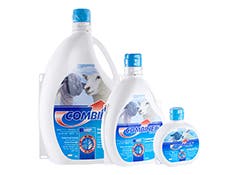
Combinex™
Combination sheep wormer and flukicide killing all 3 stages of fluke down to 2 days.
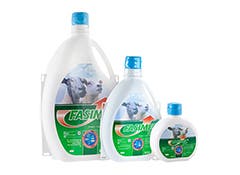
Fasimec™ Duo
Combination sheep wormer and flukicide killing all 3 stages of fluke down to 2 days.
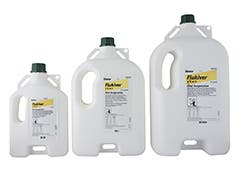
Flukiver™
Flukicide for sheep & lambs; contains closantel to kill fluke, nasal bots & H.contortus.

Combinex™
Combination sheep wormer and flukicide killing all 3 stages of fluke down to 2 days.

Fasimec™ Duo
Combination sheep wormer and flukicide killing all 3 stages of fluke down to 2 days.

Flukiver™
Flukicide for sheep & lambs; contains closantel to kill fluke, nasal bots & H.contortus.

Combinex™
Combination sheep wormer and flukicide killing all 3 stages of fluke down to 2 days.

Fasimec™ Duo
Combination sheep wormer and flukicide killing all 3 stages of fluke down to 2 days.

Flukiver™
Flukicide for sheep & lambs; contains closantel to kill fluke, nasal bots & H.contortus.
1. EBLEX 2013, Economic Impact of Health and Welfare Issues in Beef, Cattle and Sheep in England.
2. NADIS bulletin: liver fluke in sheep
3. Sykes AR, Coop, RL, Rushton B (1980) Chronic subclinical fascioliasis in sheep: effects on food intake, food utilisation and blood constituents. Research in Veterinary Science Vol 28 No 1 pp 63-70.
Combinex™ Oral Suspension contains 3.75% w/v levamisole hydrochloride and 5% w/v triclabendazole. Legal category: POM-VPS.
Fasimec™ Duo 50 mg/ml + 1 mg/ml Oral Suspension for Sheep contains 50 mg/ml triclabendazoleand 1 mg/ml ivermectin. Legal category: POM-VPS.
Flukiver™ 5% w/v oral Suspension contains 50mg/ml closantel. Legal category: POM-VPS.
Rycoben™ SC for Sheep contains 2.5% w/v albendazole oxide (ricobendazole), 1.8% w/v cobalt sulphate and 0.097% w/v sodium selenite. Legal category: POM-VPS.
Supaverm™ Oral Suspension contains 5% w/v closantel and 7.5% w/v mebendazole. Legal category: POM-VPS.
Information regarding the side effects, precautions, warnings and contra-indications can be found in product packaging and leaflets; further information is available from the Summary of Product Characteristics. Advice should be sought from the medicine prescriber prior to use. Use medicines responsibly.
Elanco™, Combinex™, Fasimec™ Duo, Flukiver™, Rycoben™, Supaverm™ and the diagonal bar are trademarks of Elanco or its affiliates.
For product related technical queries, contact the Elanco Vets team:
Telephone: 01256 353131, selecting option 1 for technical services
Email: ElancoVets@elanco.com*
*please note this inbox will be checked during the next business day. If you require an urgent response to a product-use query, suspected adverse event or quality complaint regarding an Elanco product, please call 01256 353131 choosing option 1 for technical services. Outside of office hours, your call will be forwarded to our medical answer service and an Elanco representative will call you back. Thank you for your understanding.
